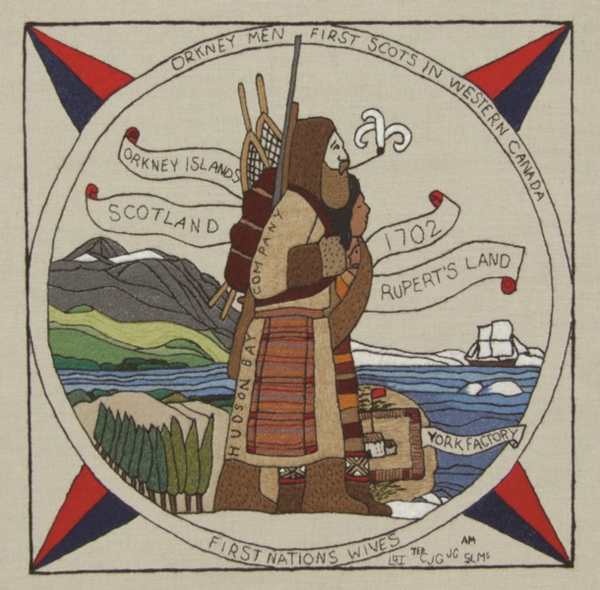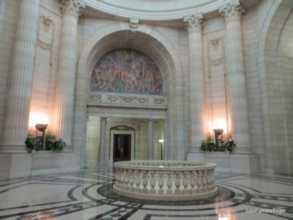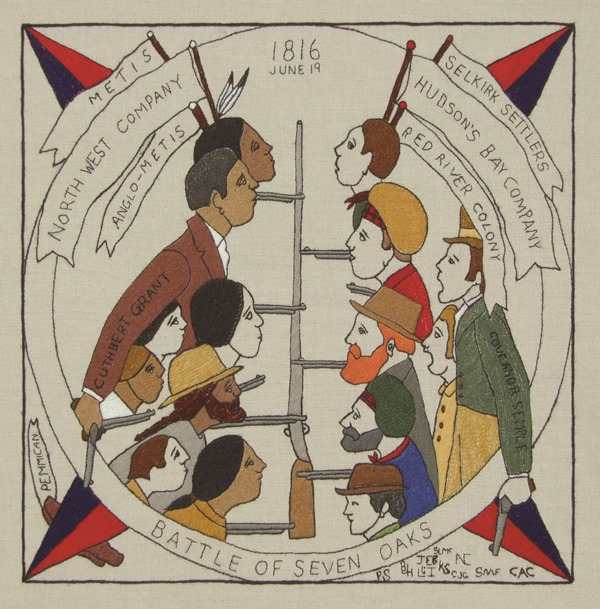June 13th/ July 3rd ... Diaspora Tapestry in Winnipeg, Manitoba
Hosted now by the Scottish Heritage Council of Manitoba ... the tapestry begins its journey across Canada after successful landfall in Victoria BC
The role of the Scots in the foundation of the city of Winnipeg and the Hudson Bay Company is a profound one depicted in CA 19* below.

Seven of Canada's 36 panels were stitched in Winnipeg - although just two are shown here. The other five and the balance of all 304 panels from 34 nations across the globe are on display at Manitoba Legislature, Winnipeg, from June 13th/ July 3rd, hosted by the Scottish Heritage Council of Manitoba.

 
These exhibition dates include not only Canada Day itself but also the 200th Anniversary of the Battle of Seven Oaks on June 19th depicted in CA 23** below!

______________________________________________________________________
*CA19: Fur Traders/ First Nations Wives
Stitchers: Anne Morrison, Joan Curle, Lorraine Iverach, Shelley McFadyen, Catherine (Kit) Gates, Judy Boatman (Winnipeg, Manitoba).
In 1670 the Hudson's Bay Company located their headquarters at York Factory on the shores of Hudson Bay. Initial employees were recruited from England and Ireland, but in 1702 they started recruiting at Stromness, Orkney. These men became the first Scots in Western Canada, forming three-quarters of the Hudson’s Bay’s workforce by the late 1700's. They were paid £6–£8 per year and served approximately 5 years, with several becoming officers. Many decided to stay in Canada, marrying First Nations women who provided an important link between the two cultures, acting as translators, sewing clothing, preparing food and providing companionship.
*CA19: Malairt Bèine/Mnathan nan Ciad Nàiseanan
Ann an 1670, stèidhich Companaidh Bàgh Hudson am prìomh thogalach ann am Factaraidh Iorc air cladaichean Bàgh Hudson. Bha na ciad oibrichean air an trusadh à Sasainn agus Èirinn, ach ann an 1702 thòisich iad a’ trusadh ann an tSròm Nis ann an Arcaibh. B’ iad sin na ciad Albannaich ann an Canada an Iar agus aig deireadh na 1700an, bha iad a’ dèanamh suas trìchairteal de sgioba-obrach Bhàgh Hudson. Bha iad pàighte £6–£8 sa bhliadhna agus a’ frithealadh timcheall air 5 bliadhna, le cuid aca nan oifigearan. Cho-dhùin mòran dhiubh fuireach ann an Canada, a’ pòsadh mnathan Ciad Nàiseanan a bha a’ solarachadh ceangal cudromach eadar an dà chultar, mar eadartheangairean, a’ fuaigheal aodaich, ag ullachadh bidhe agus a’ solarachadh companas.
**CA 23: Battle of Seven Oaks
Stitchers: Lorraine Iverach, Kathy Smith, Barbara Hjelte, Nicole Collette, Shelley McFadyen, Catherine (Kit) Gates, Patricia Stagg, Judy Boatman, Shirley Forsyth, Carol Ann Coish
The Hudson's Bay and North West Companies struggled for control of the fur trade in the Red River Valley, their rivalry exacerbated by the Selkirk Settlers. Hudson’s Bay supported the settlement and food supplies they could eventually offer. North West opposed the settlement along with the Métis who feared farming could interfere with hunting and the pemmican (dried bison meat) trade. Frictions escalated when exportation of pemmican was banned to provide food for the struggling settlers. During the Battle of Seven Oaks (1816), 21 settlers led by Governor Semple were killed during a confrontation with Nor' Westers and Métis hunters led by Cuthbert Grant.
**CA23 Blàr Seven Oaks
Bha Companaidhean Bàgh Hudson agus an Iar Thuath a’ strì an aghaidh a chèile airson smachd fhaighinn air malairt nam bian ann an Gleann Abhainn Dheirg; an fharpais eatarra air a dhèanamh nas miosa le luchd-tuineachaidh Sailcirc. Bha Bàgh Hudson a’ cur taic ris an tuineachadh agus an solar bidhe a b’ urrainn dhaibh a thairgsinn aig a’ cheann thall. Bha an Iar Thuath an aghaidh an tuineachaidh còmhla ri muinntir Métis air an robh eagal gun tigeadh tuathanachas san rathad air sealg agus malairt a’ phemmican (feòil Buabhaill thiormaichte). Dh’fhàs am buaireadh na bu mhiosa nuair a chaidh casg a chur air às-mhalairt air pemmican gus biadh a sholarachadh don luchd-tuineachaidh a bha a’ strì ri bith-beò. Aig Blàr Seven Oaks (1816), chaidh 21 neach-tuineachaidh air an stiùireadh leis an Riaghladair Semple, a mharbhadh ann an còmhrag le muinntir an Iar Thuath agus sealgairean Métis air an stiùireadh le Cuthbert Grant.
Published Date: June 7th 2016
|





